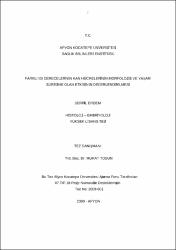Farklı Isı Derecelerinin Kan Hücrelerinin Morfolojisi ve Yaşam Süresine Olan Etkisinin Değerlendirilmesi
Künye
Erdem, Serpil. Farklı Isı Derecelerinin Kan Hücrelerinin Morfolojisi ve Yaşam Süresine Olan Etkisinin Değerlendirilmesi. Afyonkarahisar: Afyon Kocatepe Üniversitesi,2009.Özet
Giris: Apoptozis birçok vücut hücresinde olduğu gibi kan hücrelerinde de yaygın olarak
görülen bir hücre ölüm seklidir. Kan hücrelerinde apoptozisi uyaran etkenlerden bir tanesi de
ısıdır. Bu çalısmada amacımız vücut ısısının değisimi ile lökositlerde görülen apoptotik hücre
ölümünü incelemek, bu süreçte HSP70 proteininin rolünü değerlendirmek ve değisen ısının
tüm kan hücreleri oranları arasındaki olası etkisini ölçmek ve bu kriterlerin cinsler arasında
farklılık gösterip göstermediğini ortaya koymaktır.
Materyal Metot: Çalısmada yasları 18-25 arasında değisen tamamen sağlıklı 6 kadın ve 6
erkek denekten alınan kan örnekleri kullanıldı. Alınan örnekler kendi içlerinde 7 alt gruba
ayrıldı ve ısı dereceleri her saatte 2 oC arttırılmak suretiyle tüm örneklerin ısıları 37 oC’ den
43 oC’ ye çıkarıldı. Isıtma sırasında 39 oC’ ye ısıtılan örneğin bir kısmı 1 saat sonunda 37
oC’ye soğutulurken aynı islem 41 oC ve 43 oC’ ye dek ısıtılmıs örneklerede uygulandı.
Sürelerin sonunda kan örneklerinden 1 adet Giemsa ve 1 adet Đmmunohistokimyasal boyama
için 2 adet periferik yayma alındı. Aynı sekilde aynı örneklerden deneyin her basamağında
alınan kan örneklerinden tam kan sayımı ve biyokimyasal olarak HSP70 titresi ölçüldü. Elde
edilen veriler istatistiksel olarak değerlendirildi.
Bulgular: Deney sonunda artan ısı derecelerinin yüksek ısılarda daha anlamlı olmak üzere
lökositlerde apoptotik hücre ölümünü arttırdığı tespit edildi. Diğer yandan ısının düsürüldüğü
gruplarda ilginç olarak yüksek ısılardan hızla 37 oC’ ye soğutma olduğunda apoptotik hücre
ölümünün arttığı gözlendi. Bununla birlikte, tüm gruplarda HSP70 düzeylerinde anlamlı bir
değisiklik olmadığı tespit edildi. Aynı sekilde kan sekilli elemanlarının oranlarında da artan
apoptotik hücre ölümüne rağmen anlamlı değisiklik olmadığı tespit edildi. Elde edilen tüm
verilerin kadın ve erkek arasında anlamlı bir farklılık göstermediği belirlendi.
Sonuçlar: Elde edilen sonuçlar bize artan ısı derecelerinin kanda lökositlerde apoptotik hücre
ölümünü arttırdığı, buna karsın bu artısın kan hücre profilinde anlamlı bir etki yapmadığını
ortaya koymustur. Bu ısı değisimlerinin HSP70 ekspresyonuna gereksinim olmayacak kadar
az yan etkisi olduğu belirlenmistir. Introduction: As seen in most of the body cells, Apoptosis is the most common cellular death form in the blood cells. One of the factors that affect apoptosis in blood cells is temperature. Our aim of this study is to analyze apoptotic cell death related with the change of the temperature in vitro, evaluate the role of HSP70 protein during this process and measure the potential effect between the changing heat and the rate of all blood cells and display whether these criteria make differences between the genders. Materials and Methods : In this study, blood samples taken from quite healthy 6 women and 6 men from 18 to 25 years old have been used. These samples were assembled into 7 subgroups within itself and by increasing the temperature 2 oC per hour, all the samples’ heat was raised from 37 oC to 43 oC. During the heating, some part of the sample that was heated to 39 oC was cooled to 37 oC after an hour, this same process was applied on the samples that were heated to 41 oC and 43oC. At the end of the period, 2 smears were taken from the blood samples for Giemsa and Immunocytochemical stainings. From the same blood samples taken with the same method at the each steps of the experiment, complete blood cells counted and, biochemically, HSP70 titer was measured. All the data were evaluated statistically. Results: At the end of the study, it was confirmed that temperature, especially at higher temperature, raised apoptotic cellular death rate in leukocytes. On the other hand, it was seen that in the groups with decreasing temperature – surprisingly, when cooled to 37 oC from higher temperature rapidly- the death of the cells increased. Besides, there were no significant differences between the levels of HSP70 in all groups. Likewise, despite apoptotic rate was increased in higher temperature, there were no significant increasing in the proportion of blood elements. At last, all of the data got from all criteria revealed that there were no significant differences between women and men. Discussion: All the data revealed that increasing temperature triggers apoptotic cell death in blood leukocytes but this increasing did not affect the number of blood cells clearly. On the other hand, in this model, HSP70 expression is not triggered by changing of temperature.
Bağlantı
http://hdl.handle.net/11630/3579Koleksiyonlar
- Yüksek Lisans Tezleri [635]



















